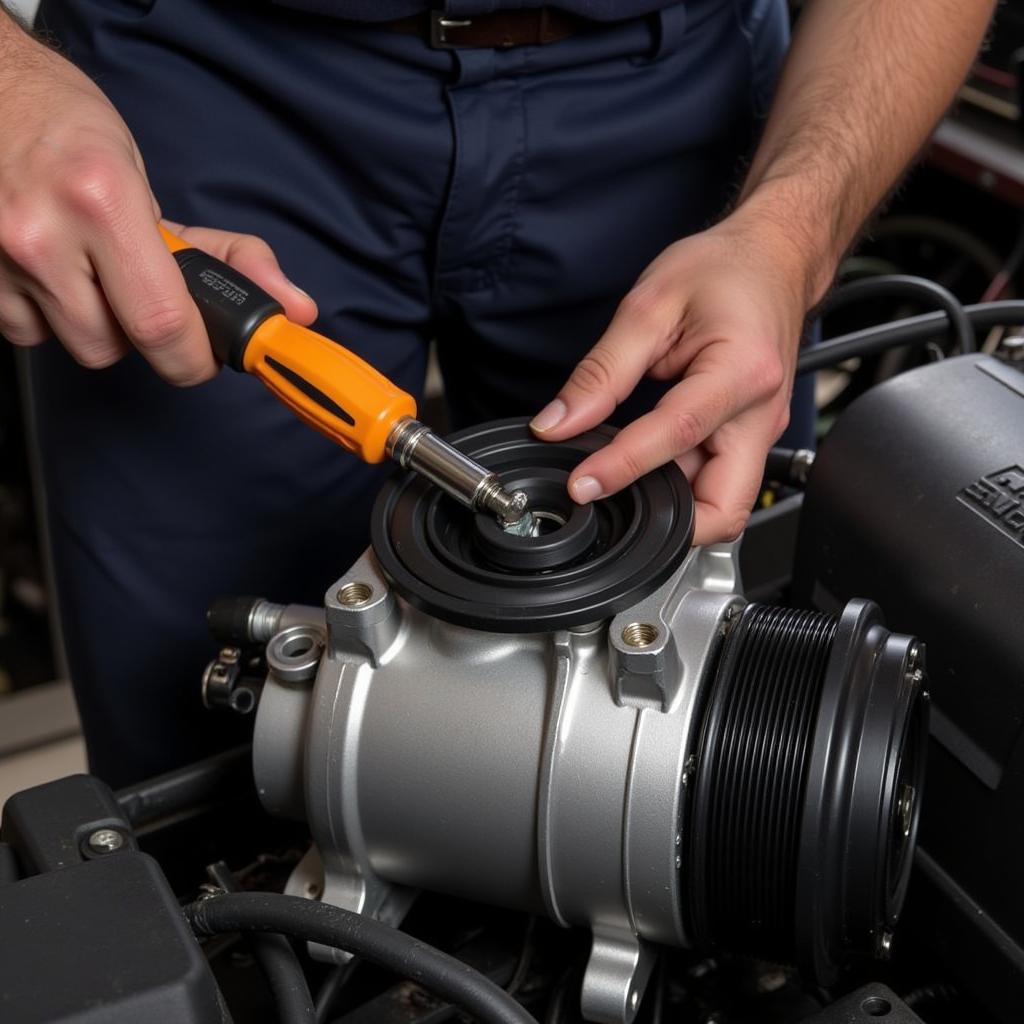Experiencing a car AC that blows hot air instead of providing a refreshing cool breeze? The culprit could be a leaking AC compressor. This vital component pressurizes and circulates refrigerant throughout your car’s AC system. When it leaks, your AC’s cooling power is compromised.
This comprehensive guide delves into the common causes of car AC compressor leaks, how to diagnose the issue, and the steps involved in fixing it.
Understanding Car AC Compressor Leaks
Before we dive into the solutions, it’s helpful to understand why your car AC compressor might be leaking.
Common Causes of AC Compressor Leaks:
- Worn-out seals and gaskets: Over time, the seals and gaskets in your AC compressor can deteriorate due to heat, friction, and exposure to refrigerant.
- Corroded compressor body: Rust and corrosion can weaken the compressor body, leading to refrigerant leaks.
- Damaged O-rings: These small, circular seals are found at various connection points in the AC system. A damaged O-ring can easily cause a leak.
- Loose fittings: Vibrations from driving can loosen the fittings on your AC compressor, resulting in refrigerant escaping.
Diagnosing the Problem: Is it Really a Compressor Leak?
While a leaking AC compressor is a common cause of AC woes, it’s important to rule out other possibilities before jumping to conclusions.
Here’s how to determine if your AC compressor is leaking:
- Inspect for visual cues: Look for signs of oil residue around the compressor and its connections. Refrigerant leaks often leave an oily residue.
- Listen for hissing sounds: A hissing or bubbling noise coming from the AC compressor when it’s running is a telltale sign of a leak.
- Check the AC performance: If your AC is blowing lukewarm air, even on the coldest setting, and other potential issues like low refrigerant levels have been ruled out, a leaking compressor is a likely culprit.
 Inspecting a Car AC Compressor for Leaks
Inspecting a Car AC Compressor for Leaks
How to Fix a Leaking Car AC Compressor: A Step-by-Step Guide
Fixing a leaking car AC compressor is not a DIY task for everyone. It involves working with refrigerant, which can be dangerous if not handled properly. However, if you’re mechanically inclined and have experience working with car AC systems, here’s a general guide:
Important: Before working on your car’s AC system, it’s crucial to wear safety glasses and gloves to protect yourself from refrigerant and debris.
-
Gather your tools and materials: You’ll need an AC refrigerant leak detector, a recovery/recycling machine, a vacuum pump, a torque wrench, replacement seals and gaskets, refrigerant oil, and of course, the correct type and amount of refrigerant for your car model.
-
Discharge the AC system: Using the recovery/recycling machine, safely remove the remaining refrigerant from your car’s AC system. Releasing refrigerant into the atmosphere is illegal and harmful to the environment.
-
Locate the leak: With the system discharged, use the leak detector to pinpoint the source of the leak on the compressor.
-
Repair or replace the leaking component: Depending on the severity and location of the leak, you may be able to replace just the faulty seal, gasket, or O-ring. If the compressor body itself is damaged, you’ll need to replace the entire compressor.
 Replacing a Car AC Compressor Seal
Replacing a Car AC Compressor Seal
-
Reassemble the AC system: After replacing the leaking component, reassemble the AC system, ensuring all connections are secure and tightened to the correct torque specifications.
-
Vacuum and recharge: Use the vacuum pump to remove any air and moisture from the system. Then, recharge the AC system with the specified amount and type of refrigerant and oil.
-
Test the system: Run your car’s AC on the coldest setting and check for leaks using the leak detector. Verify that the AC is blowing cold air and that the compressor is operating smoothly.
When to Call in a Professional
While the steps above provide a general overview, repairing a car AC compressor leak requires specialized knowledge, tools, and experience. If you’re not comfortable performing these steps yourself, it’s always best to consult a qualified mechanic specializing in automotive air conditioning.
Ignoring a leaking car AC compressor can lead to more extensive and costly damage down the road.
FAQs: Car AC Compressor Leaks
Q: Can I drive with a leaking car AC compressor?
A: While you technically can drive with a leaking AC compressor, it’s not recommended. Driving with a refrigerant leak can damage your AC system further and may even be harmful to your health.
Q: How much does it cost to fix a leaking car AC compressor?
A: The cost of repair can vary widely depending on the severity of the leak, the make and model of your car, and labor costs in your area.
Q: How often should I service my car’s AC system?
A: It’s generally recommended to have your car’s AC system serviced every 1-2 years or as recommended in your owner’s manual.
Q: Can I use a leak sealant to fix a car AC compressor leak?
A: While some leak sealants are available, they are often a temporary fix and may not address the underlying issue.
Q: How can I prevent my car AC compressor from leaking in the future?
A: Regular AC system maintenance, including inspections, refrigerant top-offs, and replacing worn-out components, can help prevent leaks.
Need Help with Your Leaky Car AC Compressor?
Dealing with a car AC that’s blowing hot air instead of cold is frustrating. Don’t sweat it! If you suspect a leaking car AC compressor is the culprit, reach out to the automotive experts at AutoTipPro. Our team of experienced technicians can diagnose the issue, provide reliable repairs, and get your AC back to blowing icy cold in no time. Contact us today at +1 (641) 206-8880 or visit our office located at 500 N St Mary’s St, San Antonio, TX 78205, United States. We’re here to keep you cool and comfortable on the road.




Leave a Reply